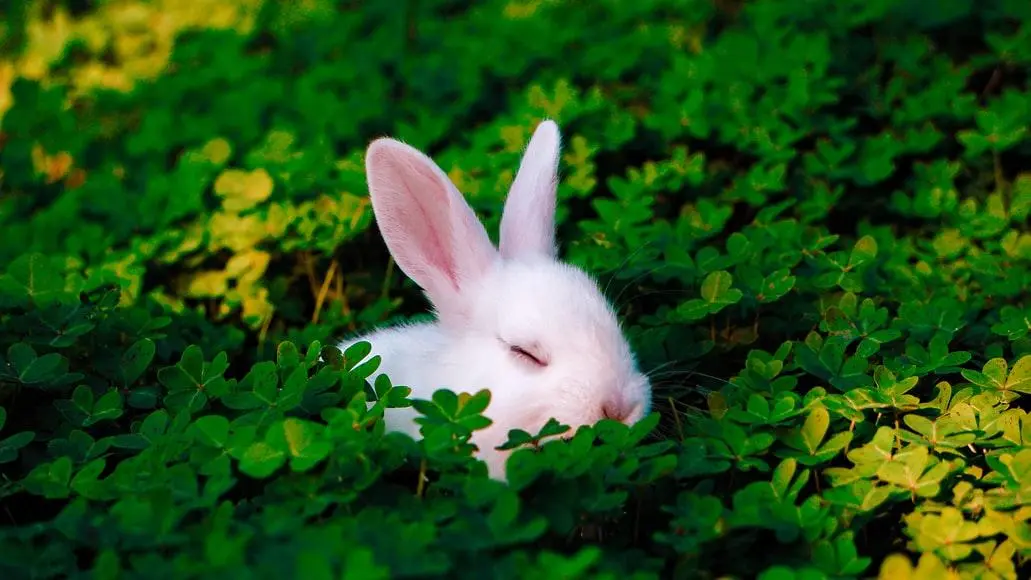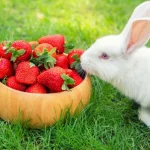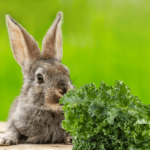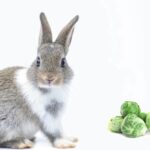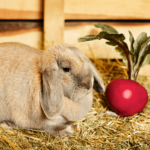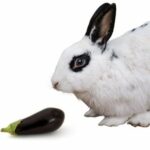Clovers, distinguished by their trefoil leaves, can be found on nearly every lawn.
They are legumes that serve as feed for grazing animals and as fodder.
Most types of clover are also suitable for human consumption.
YES. Clover is one of the safe leafy greens that we can serve rabbits. Most of the time wild rabbits eat these weeds all year round.
Clover plant leaves, stems, flowers, stalks, and even roots are safer to feed your rabbits.
Clovers are rich sources of protein, calcium, vitamin C, sodium, vitamin K, etc.
Due to the high protein, calcium, and low fiber amount, we can’t serve large amounts of Clover to rabbits.
If we feed the right amount of clover in moderation, it will be a good nutritious food source for rabbits.
Most varieties of clover are safe to feed rabbits. White and red wild Covers are some of them.
Do rabbits like eating clover?
Clover is a year-round staple for wild rabbits due to its high nutritional value, which is especially helpful in the warmer months.
Each time I let my rabbits out, they immediately went to munching on the clover plants.
Many rabbit-owning friends of mine have confirmed that they, too, occasionally provide their bunnies clover as a treat.
Is Clover Poisonous to Rabbits?
The flowering plant known as clover (Genus Trifolium) is actually a member of the pea family, the Fabaceae.
White and crimson clovers are the most common varieties used for feed.
There are three lobes on each leaf, and the flower head is round on this plant.
Since it is a completely natural product, clover makes for great rabbit chow.
Clovers come in a variety of plant shapes, but they’re always beneficial to rabbits because of the nutrients they contain.
The rabbits can safely eat them, and they are a beneficial addition to their diet.
A wide variety of leafy greens, including bok choy, mint, basil, celery, parsley, spinach, etc., can be combined with clover.
Protein, carbs, iron, vitamins C, A, K, manganese, and dietary fibre are just some of the nutrients that may be found in clover.
Remember that these are essential nutrients for rabbits.
Therefore, clover is an excellent supplement to the other greens you feed your rabbit.
For optimal health and fitness, your rabbit needs the necessary amino acids found in clover protein.
Wild rabbits will consume these plants year-round.
Clover, when fed in moderation, can provide essential nutrients to rabbits as pets.
However, hay is essential to a rabbit’s diet, so be sure to include plenty of it every day.
Hay’s high fiber content is essential for rabbits, as it prevents the growth of microorganisms that could be hazardous to the species.
The digestive tracts of rabbits also require fiber.
Even so, Rabbits can’t subsist on hay alone. Fruits and vegetables need to be a regular part of a rabbit’s diet.
In addition, for optimal health, rabbits need a varied, vitamin- and mineral-rich diet.
Because of this, they should consume leafy greens such as clover on a regular basis.
Is clover safe to be eaten by rabbits?
When compared to other weeds, such dandelions, clover is one of the safest for rabbit consumption.
Because of the high nutritional value of these weeds, wild rabbits would eat them all year long if they had the chance.
Overfeeding clovers to rabbits as a hay substitute is the most likely scenario in which clovers will cause harm to rabbits.
Constipation and other digestive issues would likely follow a diet low in fibre.
Extra Information About Clover
Members of the clover family, Fabaceae, are classified as legumes. Trifolium is another name for clover.
These plants are almost often grown for the sole purpose of being used as fodder.
Most types of clover are rather little and have only four leaves. Clovers represent trust, adoration, fortune, and expectation.
There are numerous types of clovers. Varieties of white, red, purple, and pink clover are among the most widely grown.
Flower colors range from red to white to purple, and the stems of these plants are silky.
Both humans and animals benefit from the use of clover.
Among the many nutrients that clover provides, mention can be made of its high levels of protein, calcium, vitamin C, vitamin A, manganese, sodium, iron, and so on.
The use of clover has been linked to improved bone health and a decreased risk of cancer.
Types Of Clover Varieties Rabbits Can Eat
When fed in moderation, any of these kinds is fine for rabbits.
The Clover plant itself is safe for rabbit consumption because it has no toxins.
However, if you feed them too much, they may develop health problems like gas and bloat. Rabbits require a constant supply of high-quality hay.
Nonetheless, moderate amounts of Clover can be provided to rabbits without any ill effects.
Clovers like this are commonly found in areas where rabbits are kept.
- White Clover
- Red Clover
- Yellow Clover
- Wild Clover
- Purple Clover
- Sweet Clover
- Crimson Clover
The Proper Way To Feed Clover For Rabbits
Clover should always be kept fresh for rabbits.
Do not gather Clover in heavy pesticides or chemically treated regions.
When first feeding Clovers to rabbits, it is best, to begin with very little amounts (Approximately five leaves). Carefully examine them for the time being.
If symptoms of the disease appear, switch to the rabbits’ regular food and cease giving them Clovers (Diarrhea, lethargy, constipation, and loss of appetite are some of the illnesses)
My advice is to feed mature rabbits, Clover.
Never give Clover to a rabbit. In time, rabbits will have trouble digesting clover.
Clover is dangerous for newborn rabbits because of its high calcium content. It’s healthy nourishment for full-grown rabbits.
Keep Clover as the only source of calcium in the rabbit’s diet.
How Often Can Rabbits Eat Clover
Your rabbit might benefit from eating some fresh clover.
However, we must ensure they are fed in accordance with the correct guidelines.
They can reap the benefits of Clover in even a modest dose.
When you overfeed your pet, it may get bloated and have excess gas.
It’s okay to feed rabbits up to 10 percent of their diet in greens, but we should never overdo it.
Clover is quite safe for your rabbit as long as we give it the proper amount.
Based on your rabbit’s weight, we can supply the appropriate amount of Clover.
Rabbits can thrive on as little as 1 cup of food for every 2 pounds they weigh.
Keep in mind that rabbits need access to fresh clovers that haven’t been exposed to any chemicals or pesticides.
Clover shouldn’t be fed to rabbits under the age of 12 weeks or rabbits with digestive issues.
Risk Of Feeding Clover To Rabbits
Clover can’t be given to rabbits too frequently or in excessive quantities.
When fed in excess, clover might harm the kidneys due to its high calcium concentration.
Its substantial protein content will encourage speedy growth in your rabbit’s frame.
The lack of fiber in clover can make it difficult to digest if consumed in large quantities.
This will cause gas and bloating as well as stomach cramps, diarrhea, and an empty feeling.
A lot of plants in the wild have been contaminated with artificial substances.
Similarly, rabbits are susceptible to serious health problems as a result of this.
Before giving them to your rabbit, make sure you wash them thoroughly.
Why Should Rabbits Consume Clover in Moderation?
Clover as the sole plant in a rabbit’s diet may lead to a host of health problems.
Clover can help rabbits, but it’s important to exercise caution.
Trefoil is a leafy green that should be consumed by rabbits in moderation.
The protein and calcium content of clover hays is comparable to that of alfalfa.
Consuming more than an adult domestic rabbit needs in one sitting could be harmful to their health because of the surplus of nutrients.
It promotes the formation of bladder sludge and raises the possibility of kidney stones.
In addition, since clover is already a good source of calcium for rabbits, we shouldn’t give them any extra calcium-rich food while they’re eating clover.
In addition, Clover and other similar plants are known to produce gas in rabbits, thus limiting your rabbit’s consumption of them is recommended.
Clover overdose (or underdose with hay) can cause fatal gastrointestinal stasis.
In addition to gas pain, your rabbit may experience various types of discomfort.
In other words, if your rabbit seems to be in pain, you should immediately cease giving it clover and related vegetables and take it to the vet.
How Do You Keep Rabbits Out of Your Clover Lawn?
The use of clover in garden design is highly recommended.
However, there are things you may do if you don’t want wild rabbits devouring your garden and landscaping plants. Think about what needs to happen next:
- Garlic powder, hot chilies, catnip, and lavender oil are all effective natural repellants that can be sprayed on grass plants to keep pests at bay.
- You should limit who can enter your yard and garden. Mesh wire fencing is one option for this purpose.
- Use a trap that won’t kill the rabbits.
Risk of overfeeding clover to rabbits.
Overfeeding a rabbit, even one that is on a healthy diet of clover, is not without its dangers.
- Gastrointestinal Stasis: If you’re trying to save money by feeding your rabbits clover instead of hay, you should know that this can lead to a condition called gastrointestinal stasis.
- Diarrhea: Diarrhea can also occur if rabbits are fed too much clover too quickly. Rabbits should be gradually transitioned onto new diets.
- Uneaten cecotropes: When rabbits switch to a diet of clover in place of hay, they may develop cecotropes, which are soft and go uneaten. It’s possible that the lack of fiber might cause the cecotropes to soften as a result.
Can baby bunnies eat clover?
Some young rabbits may nibble on clover. The odds are high that his mom had given him grass to try before.
Though, remember to keep things straightforward. From 3–4 weeks of age up to 7–8 weeks of age, you can try a combination of milk, water, alfalfa, and pellets.
Although young bunnies can eat grass, they shouldn’t be given vegetables until they’re a full 12 weeks old.
You should hold off on giving your young rabbit any additional food if you notice any negative reaction.
Find out more about rabbit infant nutrition by reading on.
Do wild rabbits eat clover?
Clover is a food source for wild rabbits, and they can find it in the wild and in farmer’s gardens, but they don’t always come across it.
They won’t consume it at all during the colder months, and they’ll have plenty of other options, such as blossoms, twigs, buds, bark, and needles, during the warmer months.
Typically, domestic rabbits will avoid either newly sprouted or overly brown clover.
In contrast to their domesticated counterparts, wild rabbits have a more accurate internal clock.
Keep in mind, though, that domesticated rabbits actually do like clover and will eat more of it if given the chance.
Furthermore, you should always do a quality control check on the cannabis you provide your rabbit.
Mosquitoes and weeds are two potential issues that can arise in sprayed vegetation.
When should you not feed clover to rabbits?
Clover shouldn’t be given to rabbits under 12 weeks of age or rabbits with digestive issues.
If you have rabbits and you know or suspect they are suffering digestive issues, you should stop feeding them everything but hay.
This would eliminate the most common source of the issue, which is a lack of fiber in your rabbit’s diet.
Lack of fiber is not the main cause of digestive difficulties in rabbits, but you should still take your pet to the vet just in case.
Conclusion
When feeding your rabbit, you should include a small amount of clover as one of the safest leafy greens. In Clovers, there are no potentially harmful components.
Rabbits may eat any portion of the plant. Among the many nutrients that clover provides, mention can be made of its high levels of protein, calcium, vitamin C, vitamin A, manganese, sodium, iron, and so on.
As a result of their high protein and calcium content, we can’t serve them in excessive quantities.
Clover is safe for rabbits to eat in little amounts, so we can offer it to them without worrying about their health.
It’s okay to feed rabbits up to 10 percent of their diet in greens, but we should never overdo it.
Clover shouldn’t be fed to rabbits under the age of 12 weeks or rabbits with digestive issues.
